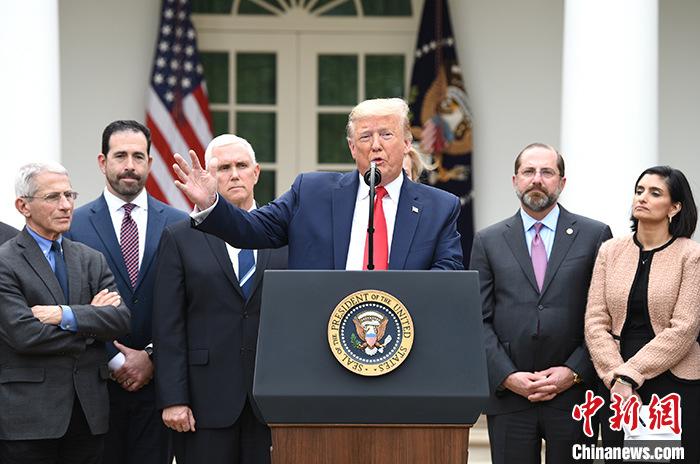(Fighting New Crown Pneumonia) Global War Epidemic: "Don't Reject" The U.S. President Buys Out a Big Drug from German Vaccine Company Gourd
China News Agency, Berlin, March 20th (Reporter Peng Dawei) Recently, the news that "the U.S. president wants to buy out a large amount of German companies to develop a new crown vaccine was rejected by the latter" has made German CureVac the focus of international media.
On March 13, local time, US President Trump announced a "national emergency" at the White House in response to the new crown pneumonia epidemic. Photo by China News Agency reporter Chen Mengtong
According to German media reports, the Trump administration of the United States offered a high price to CureVac in Tubingen, the German university town, hoping that its research and development department would be relocated to the United States to specifically develop a new crown virus vaccine for the United States. German health officials confirmed the matter to the media, for which Germany will provide financial support and leave CureVac in Germany. The European Union subsequently announced that it would provide CureVac with 80 million euros to expand the development and production of its new crown virus vaccine in Europe.
In the current large-scale competition around the development of new crown virus vaccines in many countries and teams around the world, where do German companies represented by CureVac live? Why is it favored by the United States? When will Germany expect to have a vaccine for human clinical trials? In response to the above issues, a reporter from China News Agency interviewed Dr. Marcus Schmidt, a medical and health expert at the German Federal Trade and Investment Agency (GTAI).
According to Marcus Schmidt, at least 40 companies around the world are currently engaged in the research and development of coronavirus drugs and vaccines. These include CureVac, a German company in Tubingen, and BioNTech in Mainz. In addition, there are many large international companies engaged in the production of vaccines in Germany. For example, GlaxoSmithKline (GSK), which has production sites in Magdeburg and Dresden, and Merck (MSD). These companies produce vaccines against, for example, influenza, early summer meningitis (FSME), diphtheria, pertussis, and rabies. According to data provided by the German Federal Trade and Investment Agency, global vaccine sales now reach $ 40 billion, and the market has grown rapidly in recent years.
Talking about the advantages of German companies in the development of vaccines, Marcus Schmidt believes that vaccines, like all modern drugs, are high-tech products, and their development requires the latest analysis and synthesis technology, genetic engineering laboratories, and high performance. Computers, analytical robots, etc. In addition, high-quality drug researchers, a well-functioning research and development environment, and effective regulatory agencies are equally important.
He said that it is no accident that large Western vaccine companies have concentrated more than 70% of their industrial R & D expenditures and more than 80% of global production in Europe. "As Europe's leading pharmaceutical base, Germany has extremely advantageous conditions. No European country spends more on drug research and development than Germany."
Talking about the time required for the emergence of the new crown virus vaccine, Marcus Schmidt pointed out that the development of new drugs is a very complicated process. The entire drug development process involves hundreds of individual steps until market access is allowed. Although modern technology is used, it generally takes more than 13 years. "After all, drugs must not only be effective, they must be safe."
He pointed out that due to its special urgency, vaccine R & D producers work closely with approval authorities to shorten the process as quickly as possible. To this end, the so-called PRIME (Priority Medicines) procedure was established at the European level a few years ago, with the aim of providing as soon as possible and urgently needed medicines without giving up safety.
He noted that vaccine approval for Ebola and bird flu took about four years. "The vaccine against the new coronavirus COVID19 may be much faster because companies are not starting from scratch. Effective drugs already exist and are currently undergoing clinical trials."
"There are indications that the first batch of vaccines could be developed even this year. But their routine use still needs to be approved by globally recognized regulators." Marcus Schmidt said.
On the 19th, German media quoted CureVac's general manager as saying that the current vaccine development is progressing smoothly and trials can be conducted on animals soon. It is expected that clinical trials for humans will be conducted this summer. The key is to find a suitable dose before . (Finish)

